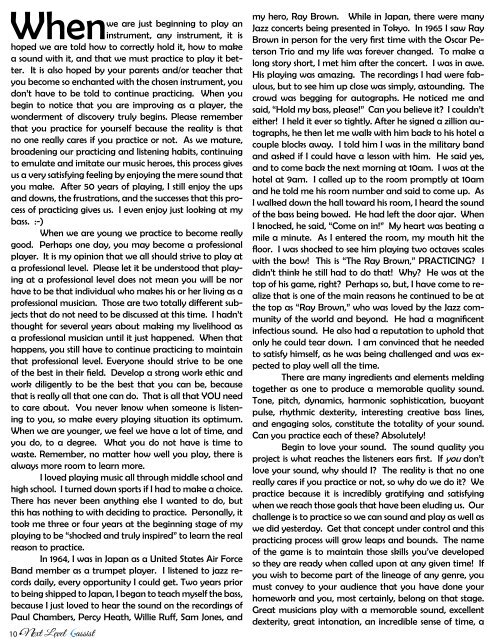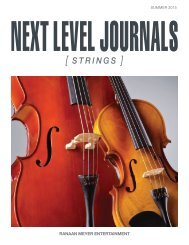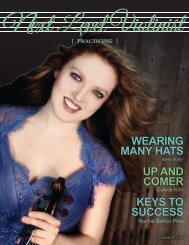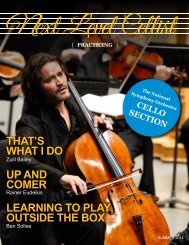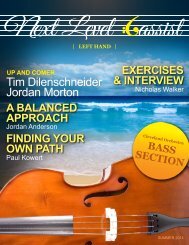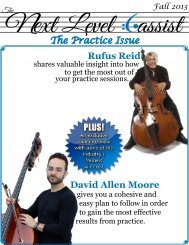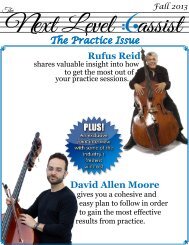The Next Level Bassist - Practicing
Articles by David Allen Moore and Rufus Reid, interviews with recent audition winners, free sheet music by Ranaan Meyer, and more!
Articles by David Allen Moore and Rufus Reid, interviews with recent audition winners, free sheet music by Ranaan Meyer, and more!
Create successful ePaper yourself
Turn your PDF publications into a flip-book with our unique Google optimized e-Paper software.
When instrument, any instrument, it is<br />
10 •<strong>Next</strong> <strong>Level</strong><br />
assist<br />
we are just beginning to play an<br />
hoped we are told how to correctly hold it, how to make<br />
a sound with it, and that we must practice to play it better.<br />
It is also hoped by your parents and/or teacher that<br />
you become so enchanted with the chosen instrument, you<br />
don’t have to be told to continue practicing. When you<br />
begin to notice that you are improving as a player, the<br />
wonderment of discovery truly begins. Please remember<br />
that you practice for yourself because the reality is that<br />
no one really cares if you practice or not. As we mature,<br />
broadening our practicing and listening habits, continuing<br />
to emulate and imitate our music heroes, this process gives<br />
us a very satisfying feeling by enjoying the mere sound that<br />
you make. After 50 years of playing, I still enjoy the ups<br />
and downs, the frustrations, and the successes that this process<br />
of practicing gives us. I even enjoy just looking at my<br />
bass. :-)<br />
When we are young we practice to become really<br />
good. Perhaps one day, you may become a professional<br />
player. It is my opinion that we all should strive to play at<br />
a professional level. Please let it be understood that playing<br />
at a professional level does not mean you will be nor<br />
have to be that individual who makes his or her living as a<br />
professional musician. Those are two totally different subjects<br />
that do not need to be discussed at this time. I hadn’t<br />
thought for several years about making my livelihood as<br />
a professional musician until it just happened. When that<br />
happens, you still have to continue practicing to maintain<br />
that professional level. Everyone should strive to be one<br />
of the best in their field. Develop a strong work ethic and<br />
work diligently to be the best that you can be, because<br />
that is really all that one can do. That is all that YOU need<br />
to care about. You never know when someone is listening<br />
to you, so make every playing situation its optimum.<br />
When we are younger, we feel we have a lot of time, and<br />
you do, to a degree. What you do not have is time to<br />
waste. Remember, no matter how well you play, there is<br />
always more room to learn more.<br />
I loved playing music all through middle school and<br />
high school. I turned down sports if I had to make a choice.<br />
<strong>The</strong>re has never been anything else I wanted to do, but<br />
this has nothing to with deciding to practice. Personally, it<br />
took me three or four years at the beginning stage of my<br />
playing to be “shocked and truly inspired” to learn the real<br />
reason to practice.<br />
In 1964, I was in Japan as a United States Air Force<br />
Band member as a trumpet player. I listened to jazz records<br />
daily, every opportunity I could get. Two years prior<br />
to being shipped to Japan, I began to teach myself the bass,<br />
because I just loved to hear the sound on the recordings of<br />
Paul Chambers, Percy Heath, Willie Ruff, Sam Jones, and<br />
my hero, Ray Brown. While in Japan, there were many<br />
Jazz concerts being presented in Tokyo. In 1965 I saw Ray<br />
Brown in person for the very first time with the Oscar Peterson<br />
Trio and my life was forever changed. To make a<br />
long story short, I met him after the concert. I was in awe.<br />
His playing was amazing. <strong>The</strong> recordings I had were fabulous,<br />
but to see him up close was simply, astounding. <strong>The</strong><br />
crowd was begging for autographs. He noticed me and<br />
said, “Hold my bass, please!” Can you believe it? I couldn’t<br />
either! I held it ever so tightly. After he signed a zillion autographs,<br />
he then let me walk with him back to his hotel a<br />
couple blocks away. I told him I was in the military band<br />
and asked if I could have a lesson with him. He said yes,<br />
and to come back the next morning at 10am. I was at the<br />
hotel at 9am. I called up to the room promptly at 10am<br />
and he told me his room number and said to come up. As<br />
I walked down the hall toward his room, I heard the sound<br />
of the bass being bowed. He had left the door ajar. When<br />
I knocked, he said, “Come on in!” My heart was beating a<br />
mile a minute. As I entered the room, my mouth hit the<br />
floor. I was shocked to see him playing two octaves scales<br />
with the bow! This is “<strong>The</strong> Ray Brown,” PRACTICING? I<br />
didn’t think he still had to do that! Why? He was at the<br />
top of his game, right? Perhaps so, but, I have come to realize<br />
that is one of the main reasons he continued to be at<br />
the top as “Ray Brown,” who was loved by the Jazz community<br />
of the world and beyond. He had a magnificent<br />
infectious sound. He also had a reputation to uphold that<br />
only he could tear down. I am convinced that he needed<br />
to satisfy himself, as he was being challenged and was expected<br />
to play well all the time.<br />
<strong>The</strong>re are many ingredients and elements melding<br />
together as one to produce a memorable quality sound.<br />
Tone, pitch, dynamics, harmonic sophistication, buoyant<br />
pulse, rhythmic dexterity, interesting creative bass lines,<br />
and engaging solos, constitute the totality of your sound.<br />
Can you practice each of these? Absolutely!<br />
Begin to love your sound. <strong>The</strong> sound quality you<br />
project is what reaches the listeners ears first. If you don’t<br />
love your sound, why should I? <strong>The</strong> reality is that no one<br />
really cares if you practice or not, so why do we do it? We<br />
practice because it is incredibly gratifying and satisfying<br />
when we reach those goals that have been eluding us. Our<br />
challenge is to practice so we can sound and play as well as<br />
we did yesterday. Get that concept under control and this<br />
practicing process will grow leaps and bounds. <strong>The</strong> name<br />
of the game is to maintain those skills you’ve developed<br />
so they are ready when called upon at any given time! If<br />
you wish to become part of the lineage of any genre, you<br />
must convey to your audience that you have done your<br />
homework and you, most certainly, belong on that stage.<br />
Great musicians play with a memorable sound, excellent<br />
dexterity, great intonation, an incredible sense of time, a


